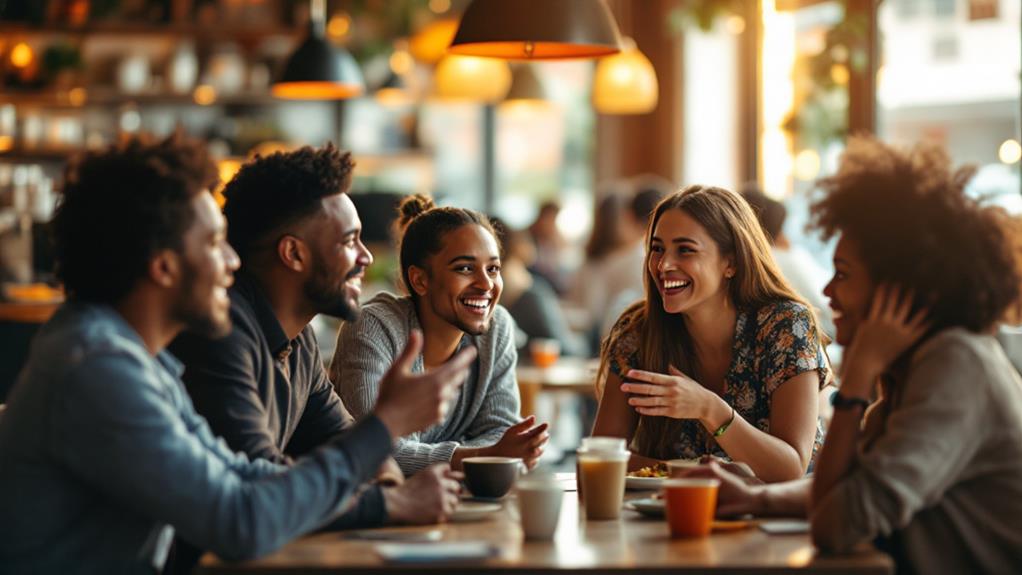How Random Conversations Can Help You Find Common Ground

Random conversations with strangers can plunge you into a world of shared experiences and common ground you never knew existed. By engaging in small talk, you'll hone your social skills and ability to read body language. These unexpected interactions can improve your mood, reduce loneliness, and cultivate a sense of belonging. As you actively listen and ask questions, you'll uncover surprising commonalities and diverse viewpoints that challenge your assumptions. These casual discussions can break down stereotypes, build empathy, and broaden your understanding of different perspectives. By embracing these chance encounters, you'll not only grow personally but also contribute to a more connected and empathetic society. The potential for meaningful connections is just a conversation away.
The Power of Unexpected Interactions

Chance encounters can be powerful catalysts for personal growth and social connection. When you engage in brief interactions with strangers, you're not just passing the time; you're opening doors to unexpected opportunities and shared experiences. These random conversations can help you find common ground with people from diverse backgrounds, broadening your viewpoint and enhancing your social skills.
As you practice small talk with various conversation partners, you'll naturally become more adept at reading body language and social cues. This heightened awareness can lead to more meaningful exchanges, even in fleeting moments. By making eye contact, smiling, and practicing active listening, you're not only boosting your own mood but also creating a positive ripple effect in your community.
Don't underestimate the impact of chatting with your bus driver or grocery store clerk. These seemingly insignificant interactions can contribute to higher life satisfaction and a greater sense of belonging. By stepping out of your comfort zone and initiating conversations with unfamiliar faces, you're nurturing personal growth and sharpening your social abilities. Embrace these unexpected encounters as opportunities to connect, learn, and grow.
Breaking Down Social Barriers
While unexpected interactions can be revolutionary, actively breaking down social barriers takes these encounters to the next stage. When you talk to strangers, you're not just passing time; you're honing your social and emotional skills. These casual conversations tend to improve your mood, reduce loneliness, and cultivate a sense of belonging in your community.
As you engage with new people, you'll find yourself getting better at reading social cues and looking for common ground. Even when people disagree, these interactions help build understanding and empathy. To make the most of these encounters, try smiling, introducing yourself, and using open-ended questions. Make eye contact to show you're genuinely interested in the conversation.
- Feel the thrill of connecting with someone new
- Experience the joy of uncovering shared interests
- Embrace the warmth of human connection in unexpected places
Discovering Shared Experiences
Three key elements make uncovering shared experiences a powerful tool for building connections. First, it's the act of engaging in conversation itself. When you talk to strangers, you're opening doors to unexpected commonalities. Whether it's chatting with a barista or striking up a conversation with a fellow passenger, these interactions can reveal shared interests and viewpoints.
Second, it's about showing genuine interest in others. By actively listening and asking questions, you're more likely to uncover shared experiences. You might find that the person you're talking to has faced similar life challenges or enjoys the same hobbies as you do.
Challenging Personal Assumptions

Engaging in random conversations doesn't just help you uncover shared experiences; it can also reshape your worldview. When you talk to strangers, you're exposed to diverse perspectives that challenge your preconceptions about different types of people. This exposure can lead to reduced prejudice and more positive views of groups you may not typically interact with.
As you engage in casual discussions with individuals from various backgrounds, you'll find yourself breaking down stereotypes and cultivating empathy. These encounters provide opportunities to practice open-mindedness and overcome biases based on limited experience. By exchanging perspectives with people outside your usual social circles, you broaden your understanding and challenge narrow mindsets.
- You'll stumble upon common ground where you least expect it
- Your assumptions about others will be shattered, opening your eyes to new realities
- You'll feel a sense of connection to humanity as a whole
Cultivating Empathy Through Conversation
Conversation's power to cultivate empathy is often underestimated. When you're talking with someone who holds different political views, you're not just exchanging ideas; you're building bridges of understanding. Research shows that these interactions can substantially reduce prejudice and increase empathy, even if you don't always see eye to eye.
To find common ground with people, spend a few minutes engaging in meaningful discussions rather than avoiding them. It's not about winning arguments but about understanding where the other person is feeling. This approach can help you see beyond caricatures and recognize the reasonable individuals behind opposing viewpoints. Remember, frequent conversations with neighbors or acquaintances who have different political beliefs can lead to lower levels of out-party prejudice.
However, it's crucial to approach these conversations without judgment. Respect is key; frequent arguments with someone you dislike politically may worsen attitudes, while discussions with someone you respect can improve them. By nurturing these connections, you're not only broadening your mindset but also contributing to better mental health and a more empathetic society.
Building a Stronger Community
While empathy is a key outcome of meaningful conversations, the impact of these interactions extends far beyond individual connections. Engaging in casual conversations with strangers can help build a stronger sense of community by nourishing connections between diverse groups. Research shows that people who frequently discuss politics with neighbors they disagree with are less likely to hold negative views about those from the opposite political party.
Findings show that preferring to talk about political differences rather than evading such conversations is linked to lower levels of prejudice towards those with opposing political views. By having friends and acquaintances you disagree with politically, you may see that people with different views are reasonable individuals, not caricatures.
To build a stronger community through conversation:
- Ask open-ended questions to encourage genuine dialogue
- Listen actively and seek to understand others' perspectives
- Take actions based on what you learn from these conversations




